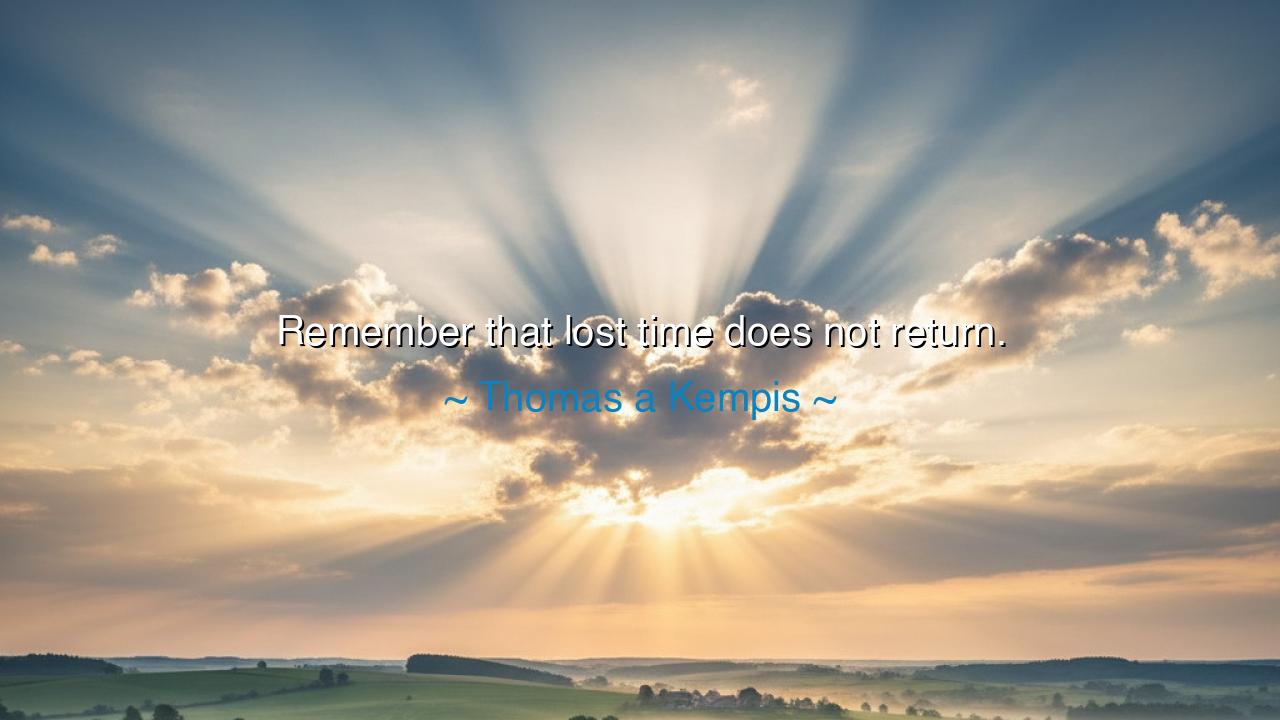
Remember that lost time does not return.






Thomas à Kempis, the humble monk of the fifteenth century and author of The Imitation of Christ, gave us these words, carved with the fire of eternal truth: “Remember that lost time does not return.” This is no gentle reminder, but a solemn warning, a tolling of the bell that calls all men and women to awaken. For time, once spilled like water upon the ground, cannot be gathered again. The hour that slips from your hand is not yours to reclaim. You may regain wealth, repair friendships, rebuild homes—but the hours you waste are gone forever.
The meaning of this teaching is both stark and liberating. Life is short, a fleeting breath, and we are tempted to squander it in distraction, in laziness, in pursuits that yield nothing eternal. Thomas à Kempis, living in the quiet cloisters of monastic life, saw how easily the human heart drifts away from purpose. Thus he warned that time is not endless clay to be shaped without thought, but a fragile flame, which once extinguished cannot be relit. His words remind us that time is sacred, because it is the measure of our lives.
History is filled with men who learned too late the cost of wasted time. Consider the Emperor Marcus Aurelius, who in his Meditations lamented how many squandered their lives chasing applause, wealth, and vanity, forgetting the brevity of existence. Or think of Napoleon, who in exile on the lonely island of St. Helena, looked back on the vast empires he had conquered and realized that his days of glory had slipped into memory, never to return. Both men, mighty in power, were brought to humility by the ticking of the clock. Their fates cry out with Thomas’s words: lost time cannot return.
And yet, the message is not only one of sorrow, but also of urgency and empowerment. If we cannot reclaim what is lost, we can still redeem what remains. To remember that time is fleeting is to awaken to the value of the present moment. Each breath, each sunrise, each chance to speak kindness, to learn wisdom, to act with courage—these are the treasures still within your grasp. And if you seize them, you will live not with regret, but with fullness.
The lesson is clear: waste no hour in bitterness, in idleness, in vain pursuits that feed neither the soul nor the body. Do not postpone love, for tomorrow may never come. Do not delay your purpose, for hesitation robs you twice—first of the present, then of the future it might have shaped. Live as though each hour is a gift from God Himself, for truly it is. As Thomas à Kempis reminds us, to waste time is to despise the giver of time.
Practical wisdom flows easily from this truth. Set aside distractions that devour your days without giving life in return. Choose moments of silence and prayer, or reflection, to remember what truly matters. Give your time to the things that endure: to love, to truth, to service, to the strengthening of your body and mind. When tempted to drift into waste, speak these words aloud to yourself: “Lost time does not return.” Let them be a spur to action, a shield against regret.
So let this teaching of the ancients guide your days. Do not mourn what has been lost, for the past cannot be summoned back. Instead, let the memory of lost hours sharpen your resolve to treasure those that remain. In this way, you will live wisely, fully, and with purpose. And when your final hour comes, you will not tremble in regret, but rejoice that you have honored the gift of time. For truly, the one who remembers that lost time does not return learns to live as if every moment were eternity itself.






AAdministratorAdministrator
Welcome, honored guests. Please leave a comment, we will respond soon